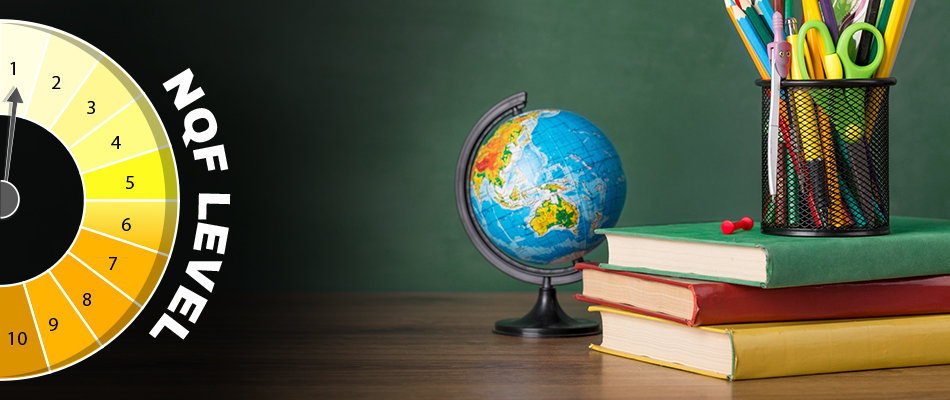Education is essential for both personal and professional development. In South Africa, the National Qualifications Framework (NQF) plays a crucial role in the education system. This system recognises and tracks academic achievements across different institutions and sectors. The NQF was created to promote lifelong learning by providing a standard for ranking both training and formal education. Whether you choose a practical, theory-based programme or a more theoretical college course, your learning achievements can be ranked on the NQF Levels. This standardisation helps with career and learning progression, so you don’t have to start from scratch when moving from technical qualifications to academic skills and education.
NQF Level 3, meaning the National Qualifications Framework Level 3 in South Africa, is crucial as it lays the groundwork for higher education and vocational training. In this article, we’ll explore its courses, equivalence, qualifications, and opportunities.
Table of Contents
What is NQF Level 3?
In South Africa, the National Qualifications Framework (NQF) categorises education and training into different levels, ranging from Level 1 to Level 10. NQF Level 3 represents an Intermediate Certificate that students earn after finishing Grade 11 or a similar vocational programme. This level is essential for preparing students to continue their studies or start their careers.
At NQF Level 3, students acquire practical skills and theoretical knowledge that connect basic education to more specialised areas. They develop critical thinking, problem-solving, and communication abilities that are crucial for personal and professional development. The qualifications at this level are designed to prepare individuals for various paths, whether they choose to pursue higher education or enter different industries directly.
After achieving the Intermediate Certificate at NQF Level 3, graduates are well-prepared to meet the evolving demands of modern workplaces and make meaningful contributions to society. Overall, NQF Level 3 represents not only academic accomplishment but also readiness for further educational opportunities or immediate employment, playing a crucial role in South Africa’s educational system.
What Is Included In The NQF Level 3 Courses?
NQF Level 3 offers a variety of courses tailored to different interests and career aspirations. These courses are designed to equip students with the necessary skills and knowledge to pursue further education at higher NQF levels or enter the workforce in their chosen fields.
The NQF Level 3 courses include:
- Business Studies: This course covers basic business principles, management skills, and entrepreneurship.
- Information Technology: It teaches essential IT skills such as computer literacy, basic programming, and network fundamentals.
- Engineering: Introduces learners to fundamental engineering concepts, technical drawing, and workshop practices.
- Hospitality: Provides an overview of the hospitality industry, covering aspects like food preparation, service standards, and customer relations.
- Health and Social Care: This industry covers essential healthcare topics, including patient care, hygiene practices, and basic medical procedures.
- Financial Accounting: Introduces learners to accounting principles, financial statement analysis, and basic financial management.
Take A Look At NQF Level 3 Question Papers
Exams and assessments provided at NQF Level 3 qualification usually use a range of question formats to test both theoretical knowledge and practical skills. They aim to measure how well learners grasp the course content and can apply it in real-life situations. Formats often include multiple-choice questions, short answers, and practical tasks.
Having access to previous question papers helps students prepare for exams by showing them what questions to expect.
NQF Level 3 Certificate and Credits
Upon successful completion of an NQF Level 3 course, learners are awarded a certificate that signifies their achievement. This certificate is a valuable credential that can be presented to potential employers or educational institutions.
Additionally, each NQF Level 3 qualification is assigned a specific number of credits, which is assessed by the amount of time required to achieve it. These credits can often be transferred towards further education, allowing learners to build on their existing knowledge and qualifications.
Know More About The NQF Level 3 Qualification
NQF Level 3 qualifications aim to equip learners with both theoretical knowledge and practical skills essential for diverse career paths. They are widely recognised across sectors, making them valuable for entering the job market or advancing in education. Common examples include:
- National Certificate (Vocational): Offered in fields like engineering, business, and IT.
- Further Education and Training Certificate: This certificate is available in sectors such as hospitality, tourism, and health and social care.
These qualifications are flexible and thorough, ensuring learners are well-prepared for their future pursuits.
What Is NQF Level 3 Equivalent To?
NQF Level 3 is equivalent to various qualifications in South Africa and abroad. In South Africa, it’s like having a Senior Certificate (Grade 11) or a TVET qualification at the same level. Internationally, it’s similar to Level 3 on the UK’s Regulated Qualifications Framework (RQF) or a high school diploma in the United States.
If you haven’t completed the matric, you can opt for a matric equivalent course. While different from a Matric certificate, this practical qualification helps you move from NQF Level 3 to NQF Level 4, preparing you for specific careers. It’s a great option if you want to start working right after your studies.
NQF Level 3 Learnerships
Learnerships at NQF Level 3 blend classroom learning with practical work experience, offering a thorough path for skill development. These programmes are highly valuable as they give learners hands-on experience in their chosen field, improving their chances of getting hired. Learnerships are available in various sectors, such as:
- Business Administration: In Business Administration, learners combine classroom learning with practical work in administrative roles.
- Engineering: In Engineering, participants receive technical training and gain real-world experience in engineering disciplines.
- Healthcare: In Healthcare, learners undergo practical training in patient care and medical support roles.
Successfully finishing a learnership leads to a nationally recognised qualification, improving the learner’s career opportunities.
NQF Level 3 Jobs To Look For
With an NQF Level 3 qualification, learners can explore various entry-level job roles across different sectors. These jobs offer valuable work experience and opportunities for advancing your career. Here are some potential opportunities:
- Administrative Assistant: You’ll assist in office settings by handling tasks like filing, data entry, and customer service.
- Junior IT Technician: You’ll help with basic IT support tasks such as troubleshooting computer issues and maintaining networks.
- Hospitality Staff: You can work in hotels, restaurants, or catering services, performing roles like waitstaff, kitchen assistants, or front desk clerks.
- Retail Assistant: You’ll manage customer interactions, stock shelves, and handle transactions in retail environments.
- Health Care Assistant: You’ll support medical professionals in clinics, hospitals, or care facilities with basic patient care tasks.
Conclusion
In summary, NQF Level 3 is an important educational achievement in South Africa. It provides a strong foundation that connects basic education with specialised knowledge. This level prepares students for higher studies or entry into different industries by teaching practical skills and theoretical principles. NQF Level 3 qualifications are flexible and widely recognised and help learners develop skills throughout their careers. Earning an Intermediate Certificate at NQF Level 3 shows readiness for diverse job opportunities, making it a key step in South Africa’s education and career paths.
What is NQF Level 3 in South Africa? Understanding Courses & Career Paths – FAQs
Q1. Is NQF Level 3 equivalent to Matric in South Africa?
Yes, NQF Level 3 is considered equivalent to a Senior Certificate (Grade 11) in South Africa. It provides a foundational qualification for further education or entering the workforce.
Q2. The NQF Level 3 is equivalent to which category in the educational system?
NQF Level 3 represents an Intermediate Certificate that prepares students with practical skills and theoretical knowledge for higher education or immediate employment.
Q3. What are the NQF Level 3 job roles you can aim for in South Africa?
With an NQF Level 3 qualification, you can explore various entry-level job roles, such as Administrative Assistant, Hospitality Staff, Retail Assistant, etc.
Q4. What salary can you expect with an NQF Level 3 qualification?
NQF Level 3 salary varies by industry and job role. Entry-level positions typically offer competitive wages that reflect the skills and knowledge acquired.
Q5. What are the career opportunities after completing NQF Level 3?
Graduates with an NQF Level 3 qualification can pursue careers in various sectors such as business administration, IT support, hospitality, retail, and healthcare.






